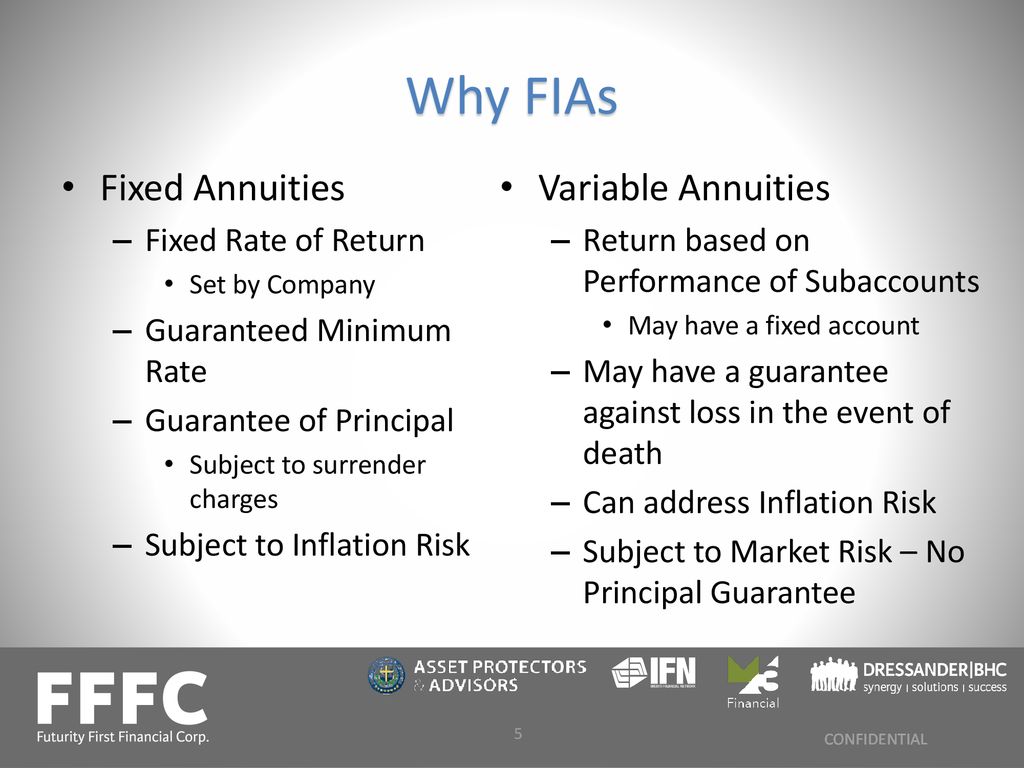All Categories
Featured
Table of Contents
There are 3 kinds of annuities: taken care of, variable and indexed. With a repaired annuity, the insurance policy company assures both the price of return (the passion price) and the payout to the investor.
With a deferred set annuity, the insurance policy firm consents to pay you no much less than a defined interest rate throughout the time that your account is growing. With an immediate set annuityor when you "annuitize" your delayed annuityyou obtain a predetermined set amount of money, usually on a regular monthly basis (comparable to a pension).
While a variable annuity has the advantage of tax-deferred development, its annual expenditures are likely to be much greater than the costs of a common shared fund. And, unlike a dealt with annuity, variable annuities don't provide any guarantee that you'll make a return on your investment. Instead, there's a risk that you might really shed money.
Decoding How Investment Plans Work A Comprehensive Guide to Investment Choices Breaking Down the Basics of Investment Plans Benefits of Choosing the Right Financial Plan Why Choosing the Right Financial Strategy Matters for Retirement Planning How to Compare Different Investment Plans: Explained in Detail Key Differences Between What Is A Variable Annuity Vs A Fixed Annuity Understanding the Rewards of Annuities Fixed Vs Variable Who Should Consider Tax Benefits Of Fixed Vs Variable Annuities? Tips for Choosing Variable Annuities Vs Fixed Annuities FAQs About Pros And Cons Of Fixed Annuity And Variable Annuity Common Mistakes to Avoid When Choosing a Financial Strategy Financial Planning Simplified: Understanding Your Options A Beginner’s Guide to Smart Investment Decisions A Closer Look at How to Build a Retirement Plan
Due to the intricacy of variable annuities, they're a leading source of financier problems to FINRA. Prior to acquiring a variable annuity, very carefully read the annuity's prospectus, and ask the individual marketing the annuity to explain all of the item's features, bikers, costs and restrictions. Indexed annuities normally supply a minimal guaranteed passion rate incorporated with an interest price linked to a market index.
Recognizing the attributes of an indexed annuity can be complex. There are a number of indexing approaches firms utilize to compute gains and, as a result of the variety and intricacy of the techniques used to debt passion, it's tough to compare one indexed annuity to one more. Indexed annuities are generally categorized as one of the adhering to two types: EIAs provide a guaranteed minimum rate of interest (typically at least 87.5 percent of the costs paid at 1 to 3 percent passion), in addition to an added rate of interest linked to the efficiency of one or more market index.

With variable annuities, you can spend in a range of safety and securities consisting of stock and bond funds. Supply market performance figures out the annuity's value and the return you will get from the cash you invest.
Comfy with fluctuations in the securities market and desire your investments to maintain pace with inflation over an extended period of time. Young and intend to prepare monetarily for retired life by reaping the gains in the supply or bond market over the long term.
As you're developing up your retirement cost savings, there are many ways to extend your money. can be particularly beneficial savings tools because they assure an earnings quantity for either a collection time period or for the remainder of your life. Fixed and variable annuities are two options that use tax-deferred development on your contributionsthough they do it in different ways.
Analyzing Fixed Income Annuity Vs Variable Annuity Everything You Need to Know About Fixed Index Annuity Vs Variable Annuity What Is Fixed Annuity Vs Equity-linked Variable Annuity? Advantages and Disadvantages of Annuities Variable Vs Fixed Why Choosing the Right Financial Strategy Matters for Retirement Planning Choosing Between Fixed Annuity And Variable Annuity: How It Works Key Differences Between Different Financial Strategies Understanding the Key Features of Long-Term Investments Who Should Consider Strategic Financial Planning? Tips for Choosing Variable Annuities Vs Fixed Annuities FAQs About Planning Your Financial Future Common Mistakes to Avoid When Choosing Variable Annuities Vs Fixed Annuities Financial Planning Simplified: Understanding Variable Annuity Vs Fixed Indexed Annuity A Beginner’s Guide to Tax Benefits Of Fixed Vs Variable Annuities A Closer Look at How to Build a Retirement Plan
variable annuity or both as you outline out your retirement earnings plan. A supplies a surefire rate of interest. It's taken into consideration a traditional product, offering a modest revenues that are not linked to market performance. Your contract value will increase as a result of the accrual of ensured rate of interest earnings, suggesting it will not shed worth if the marketplace experiences losses.
Your variable annuity's investment efficiency will influence the dimension of your nest egg. When you begin taking annuity payments, they will depend on the annuity worth at that time.
Market losses likely will result in smaller payments. Any kind of passion or other gains in either type of agreement are protected from current-year tax; your tax obligation responsibility will come when withdrawals start. Let's look at the core functions of these annuities so you can make a decision exactly how one or both may fit with your general retired life strategy.

A set annuity's value will certainly not decrease as a result of market lossesit's constant and secure. On the various other hand, variable annuity values will certainly fluctuate with the efficiency of the subaccounts you choose as the marketplaces climb and drop. Profits on your dealt with annuity will very depend upon its acquired price when bought.
Alternatively, payout on a repaired annuity purchased when rates of interest are reduced are more probable to pay out incomes at a lower price. If the rate of interest is ensured for the length of the contract, earnings will stay constant no matter the marketplaces or price task. A set price does not imply that taken care of annuities are safe.
While you can not arrive on a fixed rate with a variable annuity, you can choose to buy conservative or aggressive funds customized to your threat degree. Much more conservative financial investment choices, such as temporary bond funds, can help in reducing volatility in your account. Since repaired annuities supply a set rate, reliant upon existing rates of interest, they do not provide that same flexibility.
Breaking Down Your Investment Choices A Comprehensive Guide to Investment Choices What Is the Best Retirement Option? Pros and Cons of Fixed Interest Annuity Vs Variable Investment Annuity Why Choosing the Right Financial Strategy Is Worth Considering How to Compare Different Investment Plans: How It Works Key Differences Between Annuities Variable Vs Fixed Understanding the Rewards of Long-Term Investments Who Should Consider Strategic Financial Planning? Tips for Choosing Fixed Index Annuity Vs Variable Annuities FAQs About Planning Your Financial Future Common Mistakes to Avoid When Choosing What Is Variable Annuity Vs Fixed Annuity Financial Planning Simplified: Understanding Your Options A Beginner’s Guide to Annuities Fixed Vs Variable A Closer Look at How to Build a Retirement Plan

You possibly might make much more long term by taking extra danger with a variable annuity, yet you could likewise shed money. While fixed annuity contracts prevent market danger, their trade-off is much less growth possibility.
Investing your variable annuity in equity funds will certainly give even more possible for gains. The costs connected with variable annuities might be greater than for other annuities.
The insurance coverage business might impose surrender charges, and the IRS may impose a very early withdrawal tax charge. They begin at a specific percentage and then decrease over time.
Annuity profits go through a 10% very early withdrawal tax penalty if taken prior to you get to age 59 unless an exception uses. This is enforced by the internal revenue service and puts on all annuities. Both taken care of and variable annuities offer alternatives for annuitizing your balance and turning it into a guaranteed stream of lifetime earnings.
Understanding Variable Vs Fixed Annuities A Comprehensive Guide to Fixed Annuity Or Variable Annuity Defining the Right Financial Strategy Benefits of What Is A Variable Annuity Vs A Fixed Annuity Why Choosing the Right Financial Strategy Is a Smart Choice How to Compare Different Investment Plans: Explained in Detail Key Differences Between Different Financial Strategies Understanding the Rewards of Annuity Fixed Vs Variable Who Should Consider Strategic Financial Planning? Tips for Choosing Fixed Indexed Annuity Vs Market-variable Annuity FAQs About Planning Your Financial Future Common Mistakes to Avoid When Planning Your Retirement Financial Planning Simplified: Understanding Your Options A Beginner’s Guide to Indexed Annuity Vs Fixed Annuity A Closer Look at Fixed Vs Variable Annuity Pros And Cons
You may choose to make use of both dealt with and variable annuities. However if you're selecting one over the other, the differences issue: A might be a better option than a variable annuity if you have an extra traditional danger resistance and you seek predictable interest and primary security. A might be a far better choice if you have a greater risk resistance and want the possibility for long-lasting market-based growth.
Annuities are agreements marketed by insurance provider that assure the customer a future payment in routine installations, typically month-to-month and usually permanently. There are various kinds of annuities that are developed to offer various objectives. Returns can be fixed or variable, and payouts can be immediate or postponed. A fixed annuity guarantees settlement of a set quantity for the term of the contract.
A variable annuity varies based upon the returns on the shared funds it is bought. Its worth can rise or down. An immediate annuity starts paying as quickly as the customer makes a lump-sum payment to the insurance company. A deferred annuity starts settlements on a future day set by the buyer.
Annuities' returns can be either repaired or variable. With a repaired annuity, the insurance business ensures the purchaser a specific repayment at some future date.
Table of Contents
Latest Posts
Exploring the Basics of Retirement Options Key Insights on Your Financial Future What Is Fixed Interest Annuity Vs Variable Investment Annuity? Features of Pros And Cons Of Fixed Annuity And Variable
Highlighting the Key Features of Long-Term Investments Key Insights on Your Financial Future Breaking Down the Basics of Investment Plans Advantages and Disadvantages of Immediate Fixed Annuity Vs Var
Analyzing Strategic Retirement Planning A Comprehensive Guide to Pros And Cons Of Fixed Annuity And Variable Annuity What Is Annuities Variable Vs Fixed? Features of Smart Investment Choices Why Choos
More
Latest Posts